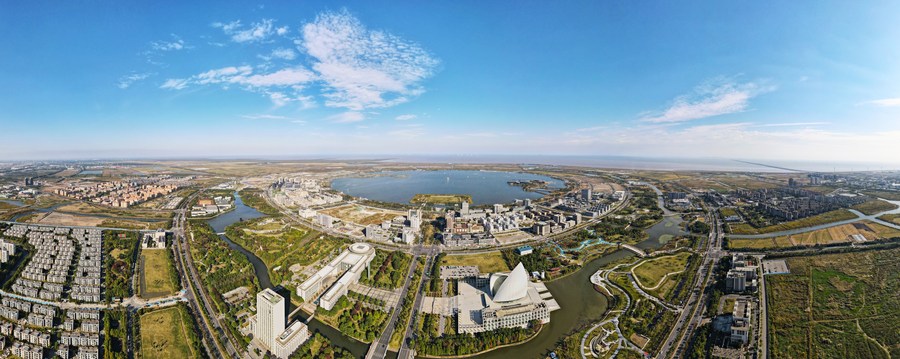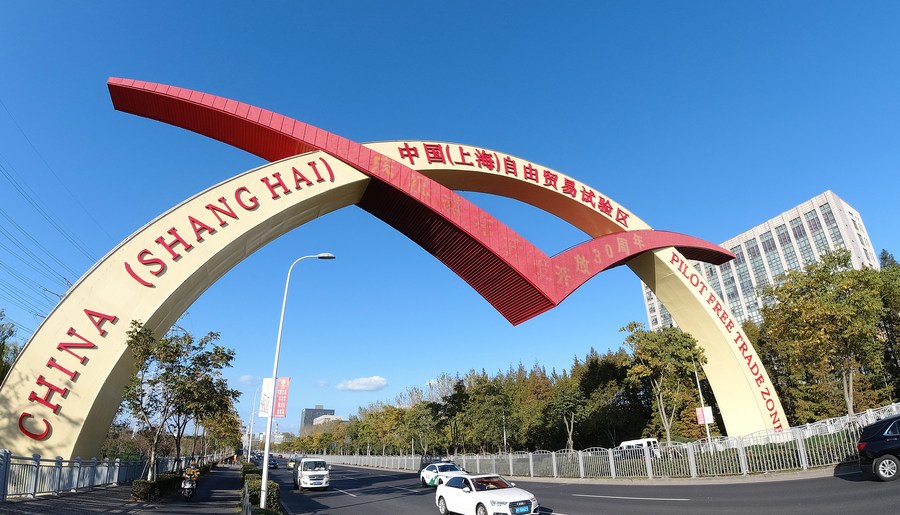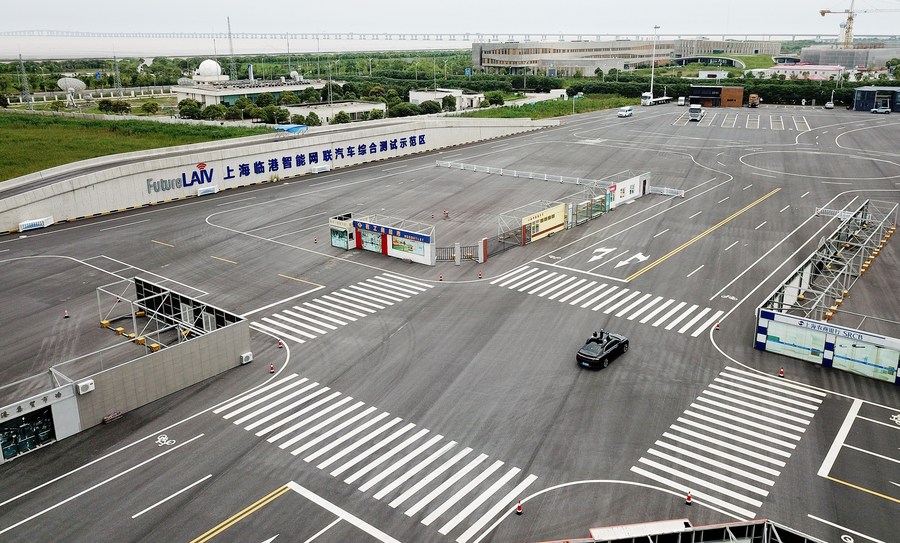30 years on, China's Pudong embarks on new journey under Xi's leadership
Chinese President Xi Jinping on Thursday called for new roles and new missions for Shanghai's Pudong as the country celebrates the 30th anniversary of the area's development and opening-up.
Xi, also general secretary of the Communist Party of China (CPC) Central Committee and chairman of the Central Military Commission, delivered an important speech at a grand gathering in Shanghai.
Efforts should go into making Pudong a pioneer of reform and opening-up at a higher level, and a vanguard in fully building a modern socialist country, Xi said.
Pudong should also strive to become an example that highlights the Chinese people's confidence in the path, theory, system, and culture of socialism with Chinese characteristics, he said.

Aerial panoramic photo taken on Oct. 25, 2020 shows a view of the Lin-gang Special Area of Pudong New Area in Shanghai, east China. (Xinhua/Fang Zhe)
DEVELOPMENT VANGUARD
When China announced the strategic decision to develop and open up Pudong in 1990, the area consisted of farmland and was considered far less-developed compared with its neighbor across the Huangpu River, Puxi.
"A single bed in Puxi is preferable to a room in Pudong." This was a popular saying in Shanghai back then.
Within 30 years, Pudong has become one of the country's most prosperous districts, with its regional GDP surging by more than 210 times since 1990.
The area is now home to over 1,000 financial institutions, over 300 regional headquarters of multinationals, and more than 240 foreign-invested research and development centers.
"The achievements of Pudong over the past 30 years offer the most telling evidence of the strength of the system of socialism with Chinese characteristics, and are a vivid demonstration of the country's reform, opening-up, and socialist modernization," Xi said at the gathering.
The significance of Pudong's development and opening-up went beyond its own prosperity. Over the years, the area has turned into a destination for policymakers to pilot policies that were later tried out across the country.

Photo taken on Nov. 11, 2020 shows a view of the China (Shanghai) Pilot Free Trade Zone at Pudong New Area in Shanghai, east China. (Xinhua/Fang Zhe)
China (Shanghai) Pilot Free Trade Zone (FTZ), the first pilot FTZ in the country, was established in Pudong in 2013. Some 120 institutional innovations rolled out there have been replicated and promoted nationwide ever since.
The role of Pudong as the testing ground for institutional innovations was further exemplified as the country launched the new Lingang area of the Shanghai pilot FTZ last year.
Located largely in Pudong, the new Lingang area saw industrial investments surge by 52.2 percent year on year in the first three quarters this year despite external headwinds.

Aerial photo taken on July 3, 2020 shows the testing vehicles at Shanghai Lin-gang Autonomous and Informationalized Vehicle Integrative Testing and Demonstration Zone at Pudong New Area in Shanghai, east China. (Xinhua/Fang Zhe)
NEW MISSIONS
The coming 30 years, from now to the middle of the 21st century, will be a time for China to build a great modern socialist country, Xi stressed, calling on Pudong to play new roles and accomplish new missions in the new march.
All-out efforts should be made to make the innovation engine stronger and explore new horizons of independent innovation, Xi said.
He urged the achievement of major innovations in basic science and technology and breakthroughs in key and core technologies. He also called for speeding up the creation of world-class industrial clusters in sectors including integrated circuits, bio-medicine and artificial intelligence.
He stressed a coordinated approach in promoting reforms in key areas and links and the creation of a world-class business environment that is market-oriented, law-based and internationalized.
Xi also stressed creating new advantages in global cooperation and competition, as well as advancing opening-up, with institutional guarantees in the areas of management, standards, rules and norms.
Pudong should give more significance to the role of the Lingang area of the Shanghai pilot FTZ and speed up the joint building of a global shipping hub together with the Yangtze River Delta region, Xi said.
Efforts should also go into strengthening the capability of mobilizing global resources and serve the establishment of the new development pattern, and enhance the global influence on mobilizing factors including funds, information, technology, skills and goods, Xi said.
Xi urged Pudong to establish an international financial-asset trading platform, develop a higher-level headquarters economy, and build itself into an important hub of global industrial, supply and value chains.
The president also called for modernizing urban governance, opening up new prospects for urban construction of, for and by the people, and exploring a megacity development path that reflects Chinese features and the characteristics of the times, while highlighting the advantages of China's socialist system.
Noting that Shanghai is the birthplace of the CPC, Xi stressed passing on the traditions of revolution and acting on the party's original aspirations and missions.